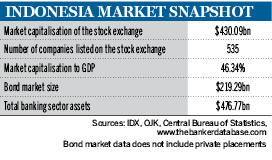One of the key objectives for Indonesia’s financial supervisory authority, Otoritas Jasa Keuangan (OJK), is to expand the local bond market. Dominated by government bond paper, the local currency bond sector has yet to become a platform for strong corporate issuance. As of February 2017, corporate paper accounted for only 14% of Indonesian local currency bonds, while government bonds made up the remainder.
More from this report
- Building Asia's capital markets: key strategies for diverse economies
- China boosts Hong Kong's derivatives dream
- India's NSE and BSE bourses square up for battle
- Malaysia's shot in the arm for Islamic wealth management
- Myanmar finds small solutions are best as microfinance fills funding gap
- Singapore aims to be a fintech kingmaker
- Thai stock exchange reveals plan to double its market cap
To help boost supply, the OJK has reduced issuing costs by cutting the amount of documentation required by borrowers to come to market. As a result, the number of days needed to get a bond issuance off the ground has fallen from 45 to 35.
Low demand
According to Nurhaida, the OJK chief executive of capital market supervision, low investor demand is also part of the problem. Foreign investor appetite is particularly low. If foreign buyers account for about half of Indonesia’s equity market, they only take up 5% of the local bond market. But why is this the case?
Part of the problem is that foreign investors have to contend with a tougher tax regime than local bond buyers. However, the OJK is working with Indonesia’s tax office to give more incentives. “Even if tax revenue were to drop at first, a lighter tax treatment could grow the market overall and we would ultimately generate larger tax revenues. It is not easy [to have this discussion] because we have different needs [to the tax office],” says Ms Nurhaida.
The relatively small size of Indonesia’s bond market might also deter foreign buyers: trading volumes are small and liquidity is low. Growing numbers of repo transactions could be a way to increase market liquidity, says Ms Nurhaida. To that end, the OJK issued a global master repurchase agreement in 2015 to make repo transactions in Indonesia match global best practices. The regulator is also set to launch an electronic trading platform for bonds in the first half of 2017. “This will make trading more transparent and price discovery easier,” says Ms Nurhaida.
Local interest
Aside from foreign investors, domestic buyers have also come up against unfriendly market guidelines. Historically, institutional investors were only allowed to buy bonds that were rated A or higher. “But BBB rated bonds are also investment grade,” says Ms Nurhaida. Now, institutional investors are allowed to buy any bonds provided they are investment grade.
Indonesia’s tax amnesty programme could help develop the local bond market further. Launched in 2016, it encourages the repatriation of Indonesian cash held overseas while giving tax avoiders a way to disclose their assets. Under the plan, the tax rate on declared property or funds parked overseas starts at 4%. If undeclared, these assets could be subject to tax rates of up to 200%. So far, the programme has raised Rp143,000bn ($10.7bn) in tax revenue.
“For now, the repatriated funds need to go through the banking system, but these asset-holders are going to start looking for investment products that can generate some returns,” says Ms Nurhaida. The local bond market could meet this demand.
Infrastructure push
Indonesia’s chunky national infrastructure investment plan could be a further source of growth for the local bond market. It requires Rp1,103,000bn in investment in 2017 alone, of which Rp378,200bn will come from the national budget. Regional budgets, state-owned enterprises and the private sector will cover the remainder.
“This is a very good chance for capital markets to increase their role in Indonesia’s infrastructure development. Long-term financing provided by bonds is not only a direct source of funding for infrastructure development, but also a source of funding for the governments, banks and other financing institutions [involved] in infrastructure development,” says Ms Nurhaida.
Indeed, Panji Irawan, managing director, treasury and international at state-owned lender Bank Negara Indonesia (BNI), believes the infrastructure investment programme will generate economic growth as well as business opportunities for the bank and its securities department in 2017.
BNI’s infrastructure business is mostly dominated by syndication loans arranged with other state banks. “[But] in addition to loans, our infrastructure financing business also involves helping borrowers with foreign exchange management or trade financing,” says Mr Irawan. In 2016, BNI financed infrastructure and government projects worth a total of Rs185,000bn.












